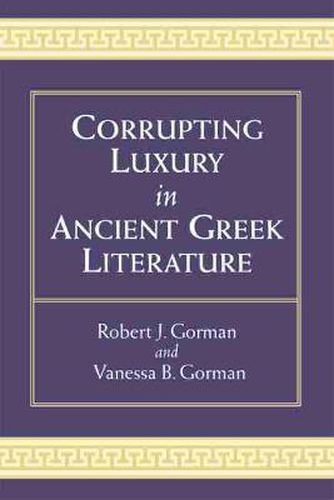Readings Newsletter
Become a Readings Member to make your shopping experience even easier.
Sign in or sign up for free!
You’re not far away from qualifying for FREE standard shipping within Australia
You’ve qualified for FREE standard shipping within Australia
The cart is loading…






A widely accepted truism says that luxury corrupts, and in both popular and scholarly treatments, the ancient city of Sybaris remains the model for destructive opulence. This volume demonstrates the scarcity of evidence for Sybarite luxury, and examines the vocabulary of luxury used by the Hellenic world. Focus on the word truphe reveals it means an attitude of entitlement: not necessarily a bad trait, unless in extreme form. This pattern holds for all Classical evidence, even the historian Herodotus, where the idea of pernicious luxury is commonly thought to be thematic.
Advancing a new method to evaluate this fragmentary evidence, the authors argue that almost all relevant ancient testimony is liable to have been distorted during transmission. They present two conclusions: first, that there exists no principle of pernicious luxury as a force of historical causation in Hellenic or Hellenistic literature. Rather, that idea is derived from early Latin prose historiography and introduced from that genre into the Greek writers of the Roman period, who in turn project the process back in time to explain events such as the fall of Sybaris. The second conclusion is methodological. The authors lay down a strategy to determine the content and extent of fragments of earlier authors found in cover texts such as Athenaeus, by examining the diction along synchronic and diachronic lines.
Serious scholars of intellectual history, the history of morality, and historiographical methodology will find this work of interest.
$9.00 standard shipping within Australia
FREE standard shipping within Australia for orders over $100.00
Express & International shipping calculated at checkout
A widely accepted truism says that luxury corrupts, and in both popular and scholarly treatments, the ancient city of Sybaris remains the model for destructive opulence. This volume demonstrates the scarcity of evidence for Sybarite luxury, and examines the vocabulary of luxury used by the Hellenic world. Focus on the word truphe reveals it means an attitude of entitlement: not necessarily a bad trait, unless in extreme form. This pattern holds for all Classical evidence, even the historian Herodotus, where the idea of pernicious luxury is commonly thought to be thematic.
Advancing a new method to evaluate this fragmentary evidence, the authors argue that almost all relevant ancient testimony is liable to have been distorted during transmission. They present two conclusions: first, that there exists no principle of pernicious luxury as a force of historical causation in Hellenic or Hellenistic literature. Rather, that idea is derived from early Latin prose historiography and introduced from that genre into the Greek writers of the Roman period, who in turn project the process back in time to explain events such as the fall of Sybaris. The second conclusion is methodological. The authors lay down a strategy to determine the content and extent of fragments of earlier authors found in cover texts such as Athenaeus, by examining the diction along synchronic and diachronic lines.
Serious scholars of intellectual history, the history of morality, and historiographical methodology will find this work of interest.